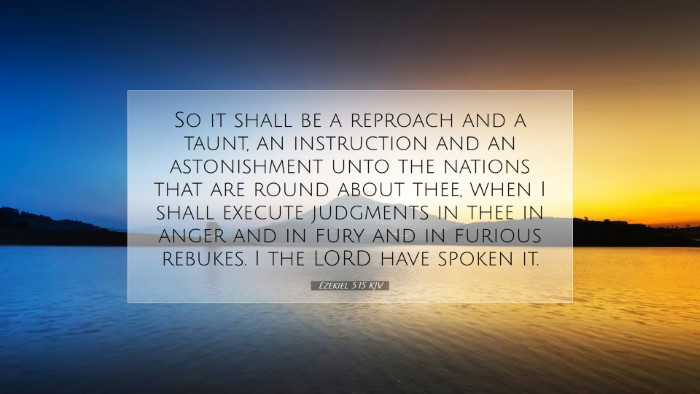Ezekiel 5:15 Commentary
Ezekiel 5:15 reads: “So it shall be a reproach and a taunt, a chastisement and an astonishment to the nations that are all around you, when I execute judgments against you in anger and in fury and in furious rebukes. I, the LORD, have spoken.” This verse encapsulates a profound message concerning God’s judgment and the repercussions of Israel’s disobedience.
Understanding the Context
The book of Ezekiel is filled with prophetic proclamations amid the context of the Babylonian exile. Ezekiel, as a prophet, conveys the severe consequences of Israel's infidelity to God. This particular verse serves as a climactic declaration of what will transpire as a result of their collective sins.
Insights from Matthew Henry
Matthew Henry emphasizes that this verse serves a dual purpose. Firstly, it points to the humiliation that would arise from God's judgment. The people of Israel, once favored and chosen, would endure scorn from neighboring nations. His commentary highlights the theme of divine justice: “God's judgments are a terror to those who refuse to heed His warnings.” Secondly, Henry underscores that the judgments executed are a necessary part of God's holiness being displayed. They serve a corrective purpose, yet they are rooted in God’s passionate nature.
Albert Barnes' Perspective
Albert Barnes gives a detailed exposition, suggesting that the stated “reproach” and “taunt” reflect not only the disdain of surrounding nations but also the internal confusion of the Israelites themselves. “When God's judgments come upon a people, it not only brings them low in their own estimation but invites derision from their adversaries,” he writes. The verse encapsulates a broader theological truth about God's interaction with nations and the way that unfaithfulness leads to a loss of esteem and integrity before others.
Adam Clarke’s Analysis
In his commentary, Adam Clarke elaborates on the phrase “execute judgments against you,” which he interprets as God’s active engagement in bringing about consequences—as a parent disciplines a child. Clarke notes that the mention of “anger” and “fury” indicates the severity of God’s response to rebellion: “The wrath of God is often described in terms of human emotions to aid in our understanding, but it is a profound reality that transcends such depictions.” Clarke challenges the reader to reflect on the fear of the Lord, which leads to wisdom and life.
Theological Implications
- Divine Judgment: This verse serves as a reminder of God's purity and the inevitability of His judgments against sin. As the scripture indicates, judgment is both just and severe, and should invoke both fear and reverence among His followers.
- Reproach Among Nations: The apparent shame that comes as a consequence of sin should prompt believers to consider their own witness before the world, highlighting the importance of living a life that reflects God’s holiness.
- God's Passionate Nature: The imagery of God’s “anger” speaks to His passionate commitment to holiness, underscoring that while He is loving and merciful, He is also just and unyielding against unrepentant sin.
Practical Applications
For pastors, students, and scholars, the verse offers several applications:
- Self-Examination: This verse prompts introspection regarding personal and communal holiness. Believers are encouraged to seek forgiveness and restoration before falling into judgment.
- Responsibility in Leadership: Those in leadership positions must heed the call for righteousness, recognizing that their actions impact not only their immediate community but the perception of the Church at large.
- Proclamation of God’s Holiness: The need for pastors to proclaim a balanced message of God’s love alongside His justice becomes evident. This duality should be woven throughout teaching to cultivate a proper understanding of who God is.
Conclusion
Ultimately, Ezekiel 5:15 serves as a poignant reminder of the consequences of sin and the reality of divine judgment. By blending insights from notable scholars like Matthew Henry, Albert Barnes, and Adam Clarke, we gain a comprehensive understanding of God’s character, the reprimand of sin, and the imperative reminder to uphold His holy standards.
The verse challenges modern believers to consider their faithfulness to God, the impact of their witness on the world, and the necessity of living in a manner that honors His name, ensuring that His judgments are not a just cause for reproach but a display of His redemptive power.


